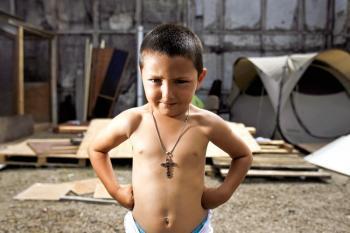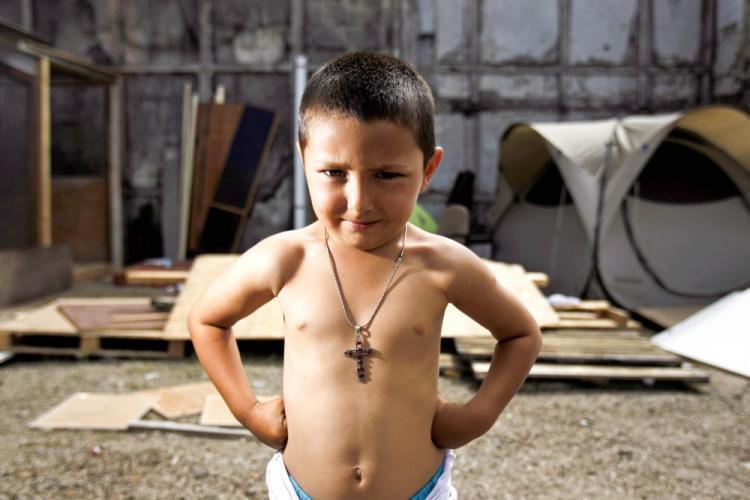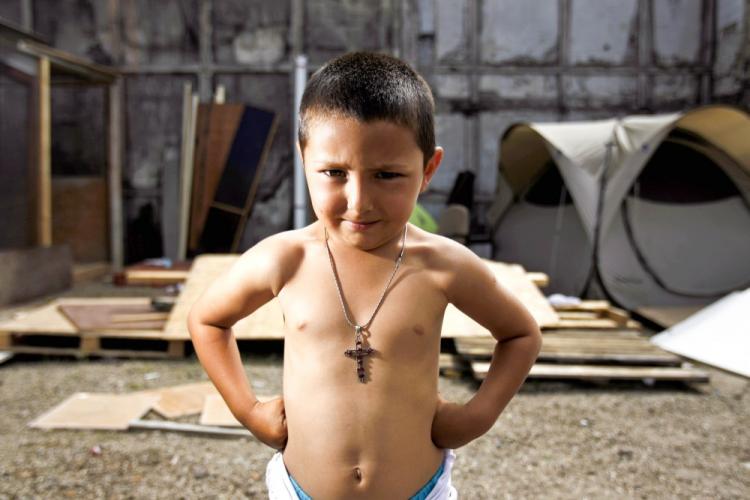PARIS—In the wake of French President Nicholas Sarkozy’s announcement last month to dismantle 300 makeshift Roma camps, French authorities will begin the first deportations on Thursday. A total of 79 Romas will be sent back to their home country—Romania or Bulgaria—with 300 euros (US$386) for each adult and 100 euros (US$128) for each child.
Another 700 expulsions are planned before the end of the month.
France calls these people “traveling folk” (“gens du voyage” in French) as an administrative category. They encompass various Roma ethnicities mainly coming from Romania, Bulgaria, and Central Europe. The generic term describes Roma people, Gypsies, and Sinti—all slightly different groups.
An Ifpo poll published on Aug. 6 in Le Figaro, a publication considered generally supportive of the Sarkozy government, showed that 79 percent of the French population agrees with the measures.
However, the expulsions are meeting with much less approval internationally.
“I am worried about the risks of populist provocation and the prompting of certain xenophobic reactions at a time of economic crisis,” Romanian Foreign Minister and former ambassador to France Teodor Baconschi told Radio France Internationale.
Experts on the United Nations Committee on the Elimination of Racial Discrimination (CERD), which reviewed on Aug. 11 and 12 France’s efforts to curb racial discrimination, harshly criticized the French government.
“How does one exclude Roma from the European Union?” commented Algerian representative Noureddine Amir. “I do not know a single country in which there could be first and second class European citizens.”
The French government, which is legally obligated to respect the European Union’s freedom of movement policy, insists that its actions are legal.
“The measures taken by the French authorities with regard to dismantling illegal camps fully conform with European rules and do not in any way affect the freedom of movement for EU citizens, as defined by treaties,” Foreign Ministry spokesman Bernard Valero told AFP.
French officials have confirmed that the expelled individuals will be allowed to come back.
The debate runs deeper than the legal plane.
“It reminds us of the Petain era,” said Nigerien member of CERD Waliakoye Saidou, comparing the new stricter movement policies for the Roma with the policies of the French head of state who ruled during World War II and who collaborated with the Nazis. Jean-Pierre Grand, an official from Sarkozy’s own governing party, the Union for a Popular Movement (UMP), described the clampdown on the camps as “raids.”
But Immigration Minister Eric Besson rejects any comparisons with World War II.
“I would very much like to see that the specific World War II vocabulary, with all the atrocity it evocates—the industrial, systematic extermination of the Jews and Gypsies—not be used,” he said.
“France isn’t striking against the Roma,” said Besson.
When Romania and Bulgaria entered the European Union in 2007, gaining their citizens the right to cross borders freely, France imposed measures to effectively exclude them from the labor market and social benefits, according to the Human Rights League. Denied the ability of a regular income, many ended up in makeshift shelters or camps.
Last year, France removed almost 10,000 Roma people.
Another 700 expulsions are planned before the end of the month.
France calls these people “traveling folk” (“gens du voyage” in French) as an administrative category. They encompass various Roma ethnicities mainly coming from Romania, Bulgaria, and Central Europe. The generic term describes Roma people, Gypsies, and Sinti—all slightly different groups.
An Ifpo poll published on Aug. 6 in Le Figaro, a publication considered generally supportive of the Sarkozy government, showed that 79 percent of the French population agrees with the measures.
However, the expulsions are meeting with much less approval internationally.
“I am worried about the risks of populist provocation and the prompting of certain xenophobic reactions at a time of economic crisis,” Romanian Foreign Minister and former ambassador to France Teodor Baconschi told Radio France Internationale.
Experts on the United Nations Committee on the Elimination of Racial Discrimination (CERD), which reviewed on Aug. 11 and 12 France’s efforts to curb racial discrimination, harshly criticized the French government.
“How does one exclude Roma from the European Union?” commented Algerian representative Noureddine Amir. “I do not know a single country in which there could be first and second class European citizens.”
The French government, which is legally obligated to respect the European Union’s freedom of movement policy, insists that its actions are legal.
“The measures taken by the French authorities with regard to dismantling illegal camps fully conform with European rules and do not in any way affect the freedom of movement for EU citizens, as defined by treaties,” Foreign Ministry spokesman Bernard Valero told AFP.
French officials have confirmed that the expelled individuals will be allowed to come back.
The debate runs deeper than the legal plane.
“It reminds us of the Petain era,” said Nigerien member of CERD Waliakoye Saidou, comparing the new stricter movement policies for the Roma with the policies of the French head of state who ruled during World War II and who collaborated with the Nazis. Jean-Pierre Grand, an official from Sarkozy’s own governing party, the Union for a Popular Movement (UMP), described the clampdown on the camps as “raids.”
But Immigration Minister Eric Besson rejects any comparisons with World War II.
“I would very much like to see that the specific World War II vocabulary, with all the atrocity it evocates—the industrial, systematic extermination of the Jews and Gypsies—not be used,” he said.
“France isn’t striking against the Roma,” said Besson.
When Romania and Bulgaria entered the European Union in 2007, gaining their citizens the right to cross borders freely, France imposed measures to effectively exclude them from the labor market and social benefits, according to the Human Rights League. Denied the ability of a regular income, many ended up in makeshift shelters or camps.
Last year, France removed almost 10,000 Roma people.




